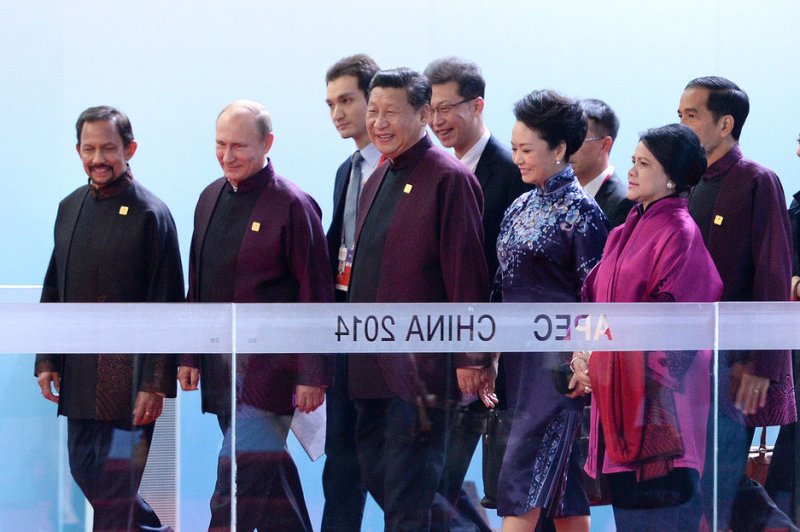Commercial deals between China and Russia will bypass the U.S. dollar in favor of rubles or renminbi
.

Chinese President Xi Jinping (4th L), his wife Peng Liyuan (6th L), Sultan of Brunei Hassanal Bolkiah (L), Russian President Vladimir Putin (2nd L), Indonesian President Joko Widodo (R) and his wife Iriana Widodo (2nd R) head to a welcome banquet for the 22nd APEC Economic Leaders' Meeting in Beijing on November 10, 2014
MOSCOW, Nov. 14 (UPI) -- Russian President Vladimir Putin said Friday his country was deliberately moving away from using the U.S. dollar for international trade.
He told the Russian news agency Tass, in an interview, Russian oil sold to China will be paid for in renminbi, the Chinese currency, part of a trend by Russian companies to denominate imports and exports in renminbi or rubles, and not U.S. dollars.
"We're moving away from the diktat of the market that denominates all the commercial oil flows in U.S. dollars," Putin said.
Direct transactions between the Russian and Chinese currencies amounted to $5.2 billion in October, up from $307 million in September, the Chinese central bank's China Foreign Exchange Trading System reported.
"Volumes are picking up as both countries aren't against using their own currencies instead of the dollar for mutual transactions. I expect the turnover to grow," Evgeny Gavrilenkov, a currency strategist at Mosciow's Sberbank Rossii, told the Wall Street Journal.
To further keep the value of the ruble up without using U.S. dollars, the Russian Central Bank purchased 55 metric tons of gold in the third quarter of 2014.
Trading in rubles and Chinese renminbi began in 2010 on the Moscow Exchange; it took economic sanctions against Russia by the United States and European Union countries to generate significant interest in the trading. The Exchange is now a partner with the Bank of China, with new services available to Russian and Chinese investors without the involvement of the U.S. dollar.
South Korea has also expressed an interest in improving commerce with China, and is intending to build an offshore hub for trade in renminbi. A trade agreement last week between China and Canada will establish a similar trade hub in Toronto, again bypassing U.S. dollars as a means of transfer of payments.
Related UPI Stories

No comments:
Post a Comment
Comments always welcome!